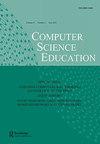Editorial
IF 2.2
Q1 EDUCATION & EDUCATIONAL RESEARCH
引用次数: 0
Abstract
This issue of Computer Science Education is themed around collaboration. With technological advances bringing remote collaboration to K-12 classrooms and higher education on a broad scale, educators and researchers face new challenges and questions. The six papers in this issue address quite different aspects, and we hope that you will enjoy these perspectives just as we did. Schulz, Berndt, and Hawlitschek open this issue with a qualitative study on how educators and learners experience teamwork in teaching and learning arrangements. In their article Exploring students’ and lecturers’ views on collaboration and cooperation in computer science courses – a qualitative analysis, they present results of their analysis of a set of semi-structured interviews with participants from three German universities. Findings include that most students preferred teamwork, and the few risks they mentioned were related to different levels of skills and engagement within a team. Instructors, on the other hand, were concerned about the effectiveness of students’ learning of technical content and about assessing teamwork, an indicator that research results and best practices regarding collaborative learning have not been as widely received as one might hope for. Some criticism raised by students addressed lower levels of support from instructors than was considered to be needed and technical problems with tools. With respect to this latter point, we note that this study was conducted at the beginning of the COVID-19 pandemic, so teaching and learning environments may have changed since then. It will be interesting to compare this snapshot to lived experiences during and after this disruption. Starting with a focus on young learners, the second article in this issue, Developing computational thinking collaboratively: the nexus of computational practices within small groups by Huang and Parker investigates collaborative learning in a middle school context. In their qualitative analysis of video observations, the authors study how middle school students engage with activities aimed at fostering Computational Thinking over the course of a five-week curriculum. Their work was driven by the observation that Computational Thinking practices and collaborative learning align well and, thus, several activities from the Creative Computing curriculum were adapted to leverage this connection. This study indicates that individual students can indeed acquire Computational Thinking practices when working in small groups; this can be seen as a response to one of the concerns documented in Schulz et al.’s article discussed above. Huang and Parker also provide vignettes documenting middle schoolers’ leveraging Computational Thinking practices while developing a solution to a given task as well as while testing and debugging their solution. These vignettes can serve as points of reference for future studies in this emerging area of research. Moving on to higher education, the work of Hawlitschek, Dietrich, and Zug is related to one of the findings from the qualitative study of Schulz et al. Their article, Effects of COMPUTER SCIENCE EDUCATION 2023, VOL. 33, NO. 3, 315–317 https://doi.org/10.1080/08993408.2023.2251331编辑
本期《计算机科学教育》的主题是合作。随着技术进步将远程协作带到K-12教室和高等教育的大范围,教育工作者和研究人员面临着新的挑战和问题。本期的六篇论文涉及不同的方面,我们希望你能像我们一样喜欢这些观点。Schulz、Berndt和Hawlitschek通过一项关于教育者和学习者如何在教学安排中体验团队合作的定性研究打开了这个问题。在他们的文章《探讨学生和讲师对计算机科学课程中协作与合作的看法——定性分析》中,他们展示了对来自三所德国大学的参与者进行的一组半结构化访谈的分析结果。调查结果包括,大多数学生更喜欢团队合作,他们提到的少数风险与团队中不同的技能水平和参与度有关。另一方面,教师关心的是学生学习技术内容的有效性和对团队合作的评估,这表明关于合作学习的研究成果和最佳实践并没有像人们希望的那样得到广泛接受。学生提出的一些批评涉及教师的支持水平低于认为需要的水平,以及工具的技术问题。关于后一点,我们注意到这项研究是在COVID-19大流行开始时进行的,因此教学环境可能在那时发生了变化。将这个快照与中断期间和之后的生活经历进行比较将会很有趣。从关注年轻学习者开始,本期的第二篇文章,发展计算思维协作:小团体中计算实践的联系,由Huang和Parker研究了中学背景下的协作学习。在对视频观察的定性分析中,作者研究了中学生在为期五周的课程中如何参与旨在培养计算思维的活动。他们的工作是由于观察到计算思维实践和协作学习很好地结合在一起,因此,创造性计算课程中的一些活动被改编为利用这种联系。本研究表明,个体学生确实可以在小组学习中获得计算思维练习;这可以看作是对上面讨论的Schulz等人的文章中所记录的一个问题的回应。黄和帕克还提供了一些小插曲,记录了中学生在为给定任务开发解决方案以及测试和调试解决方案时利用计算思维实践的情况。这些小插曲可以作为这一新兴研究领域未来研究的参考点。在高等教育方面,Hawlitschek、Dietrich和Zug的工作与Schulz等人的定性研究的一个发现有关。论文《计算机科学教育的影响》,第33卷,第2023期。3,315 - 317 https://doi.org/10.1080/08993408.2023.2251331
本文章由计算机程序翻译,如有差异,请以英文原文为准。
求助全文
约1分钟内获得全文
求助全文
来源期刊

Computer Science Education
EDUCATION & EDUCATIONAL RESEARCH-
CiteScore
6.90
自引率
3.70%
发文量
23
期刊介绍:
Computer Science Education publishes high-quality papers with a specific focus on teaching and learning within the computing discipline. The journal seeks novel contributions that are accessible and of interest to researchers and practitioners alike. We invite work with learners of all ages and across both classroom and out-of-classroom learning contexts.
 求助内容:
求助内容: 应助结果提醒方式:
应助结果提醒方式:


